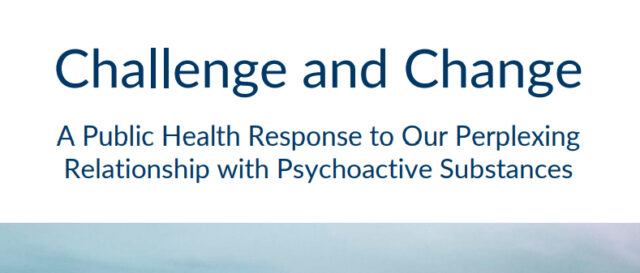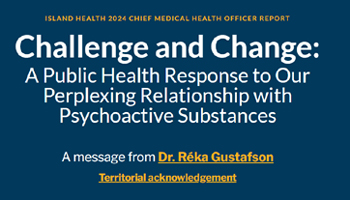
Saturday December 7, 2024 | VICTORIA, BC
by Mary P Brooke | Island Social Trends
Island Health is looking at the impact of substance use on the health-care system here on Vancouver Island.
At this year end, the Vancouver Island Health Authority (aka Island Health) has released a November 2024 report entitled Challenge and Change: A Public Health Response to Our Perplexing Relationship with Psychoactive Substances.

In a news release on December 5 to promote the 130-page report, Island Health’s Chief Medical Health Officer (CMHO) Dr. Réka Gustafson focuses on the health harms associated with the use of psychoactive substances, including alcohol, illegally manufactured opioids, tobacco, and cannabis.

Dr Gustafson Is the Vice President, Population and Public Health and Chief Medical Health Officer at Island Health. She was at the forefront of BC’s response to the COVID-19 pandemic and toxic drug crisis, providing leadership for evidence-informed public health initiatives, planning and emergency response.
An effective communicator, Gustafson aims to turn complex data and challenging concepts into accessible and digestible content for all audiences.
Alcohol, tobacco and cannabis:
Some key findings:
Alcohol:
- The use of tobacco and consumption of alcohol is higher on Vancouver Island than in the rest of British Columbia.
- Use of alcohol is increasing, but the age at which alcohol use starts is rising
- Regular drinking increases with age but binge drinking decreases after age 40
- Alcohol is the leading cause of substance-related hospital admissions in Island Health, higher than for opioids or cannabis.
Tobacco:
- Daily cigarette smoking has significantly decreased over the past 10 years
- Vaping is more common among youth than smoking tobacco
Cannabis:
- While most people in Island Health don’t use cannabis, 50% of young adults reported using cannabis in the past 12 months
- 28% of youth in school reported having tried cannabis in 2023 (slightly lower than in 2018 when the Cannabis Act came into
force) - Among those using cannabis, nearly a third reported increased use compared to before the pandemic
Hospital admissions:
Hospital admissions during 2013-2023 were far higher for alcohol than for use of opioids, stimulants or cannabis, as shown in Island Health data.
Challenge and Change:
The report, titled Challenge and Change: A Public Health Response to our Perplexing Relationship with Psychoactive Substances, reviews consumption and health outcome data for residents of Island Health related to substance use, including:
- Tobacco and alcohol consumption in Island Health is higher than in the rest of British Columbia;
- Alcohol is the leading cause of substance-related hospital admissions in Island Health;
- Unregulated drug poisonings are the top cause of death in people aged 19-59 in Island Health;
- Premature death rate due to tobacco is declining, but tobacco remains the top cause of substance use-related premature death in Island Health;
- Consumption and health harms related to substance use are inequitable across the Island Health region.
Mitigating harms:
The report also examines how differences in approaches contribute to or mitigate harms associated with substances.
“Tobacco, alcohol, and illegally manufactured opioids all cause significant harm to the health of people in Island Health,” says Dr. Gustafson.
“These harms are preventable and together we have the opportunity to reshape the narrative and drive change to improve health in our communities.”

Monitor and report:
In British Columbia, medical health officers have the statutory responsibility to monitor and report on the health of the population, providing advice on public health issues and the implementation of relevant health promotion and protection policies.
“Public narrative around substances is increasingly polarized and often based on perception, opinion and history,” says Dr. Gustafson.
“I hope the information in this report will support constructive conversations among communities, organizations, and people who use substances in Island Health to help identify and bring about meaningful change for the better.”
Opportunities for action:
The report includes opportunities for actions:
- evidence-based solutions could prevent further harms, including investing in prevention,
- supporting communities with knowledge to influence and develop policy changes,
- developing an effective and compassionate system of care for people who use substances,
- meaningfully addressing health inequities experienced by Indigenous Peoples, and
- advancing healthy public policies for substance use.
The report is intended to serve as an engagement tool to support dialogue among public health staff, clinicians, local governments, First Nation communities, and community organizations across Island Health to address the health and social challenges related to substance use in the Island Health region.
===== RELATED:
NEWS SECTIONS: HEALTH | ISLAND HEALTH | COVID-19 | VANCOUVER ISLAND









